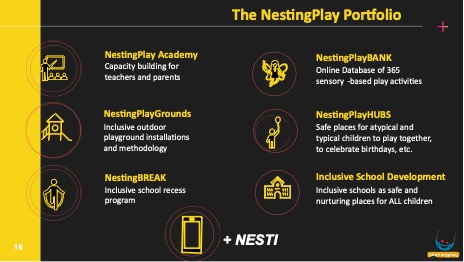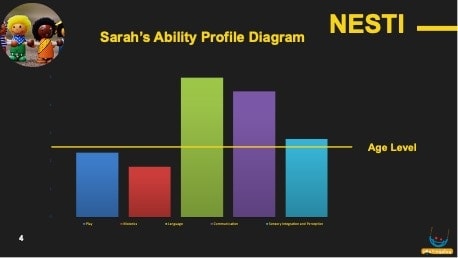“We believe in the importance of early childhood education, and the power of free play (Learning through Play)”
Quality education during the early years sets children up for success throughout their education, including reduced dropouts, increased learning outcomes, better social inclusion and higher education goals met. Today, 175 million children, 50% of the world’s pre-primary-age population are not enrolled in early educations programs. Children from disadvantaged social groups attend early childhood education (ECE) at an even lower rate and start school at a significantly lower competence and skill level. Evidence demonstrates that all children gain from attending high quality ECE but disadvantaged children have the greatest potential to benefit because their abilities are less developed when they start school, thus they have more scope for catching up.
Kincs-Ő-NestingPlay is a social enterprise from Hungary with the mission to provide inclusive early childhood education to all children, especially for those at risk of social exclusion. We believe in the importance of early childhood education, and the power of free play (Learning through Play) to improve children’s social, emotional, creative, and cognitive skill development. Our methodology also builds on the traditions of the Hungarian special education (A. Peto and A. Deveny), and the sensory-based development (M. Montessori and J. Ayres) methods.
Our indirect beneficiaries are children groups of ages 0-8, especially from vulnerable social groups, such as children from low resource communities, including minorities and refugees, children with disabilities, developmental disorders, delays and behavioral challenges. Evidence demonstrates that all children gain from attending high quality ECE but disadvantaged children have the greatest potential to benefit because their abilities are less developed when they start school, thus they have more scope for catching up. With our guidance, children can receive the needed development unnoticed through joyful play activities.
We provide education support activities to teachers in different educational institutions, parents, and municipalities, following a child’s development from 0 to 8 years. All these services are available for disadvantaged, and often segregated communities, and mainstream communities. Our goal is to enable teachers to close the developmental gaps of early age children (3-8 years) in inclusive classroom settings, contributing to better performance in school.

We aim at improving learning outcomes and social inclusion of atypically developing children through quality early childhood education. More specifically, we enable teachers to better (i) detect early developmental gaps and deficits (ii) design their curriculum-based daily activities addressing the diverse ability-profile of their students, and (iii) develop the affected weak ability areas through different joyful play activities in inclusive classroom setting.
We do not wish to create extra burden for teachers, but to increase their capacities and competencies through a blended model of offline and online capacity building services. This is now more crucial than ever, that teachers are provided support, both technological and capacity building, to more efficiently cope with the consequences of the crisis in education, such as excess learning losses, widening skill gaps and adverse behaviors.
We provide education support activities to teachers in different educational institutions, parents, and municipalities, following a child’s development from 3 to 8 years. All these services are available for disadvantaged, and often segregated communities, and mainstream communities. Our goal is to enable teachers to close the developmental gaps of early age children (3-8 years) in inclusive classroom settings, contributing to better school performance and reduced dropouts.

We provide capacity building for pre- and primary school teachers to assess children’s key abilities in five areas, essential for successful school start and performance. We have developed a special system of observation which can help teachers assess their students in different scenarios, and to receive a visualization of the child’s key abilities as compared to internationally set child development milestones. This graph defines the child weak ability areas that might hamper the evolution of those foundational skills in literacy and numeracy that are vital for successful learning to occur.

Based on the ability profile of the students, teachers can better design individualized curricula. Kincs-Ő-NestingPlay also helps teachers access our PlayBank which includes 300+ sensory-based play activities that are not only fun to play, but also develop specific ability areas. This way, teachers can screen from the PlayBank the play activities that develop the weak ability areas detected through the observation phase. These play activities are beneficial for all children, including those with weak abilities along with those with no identified developmental issues. All these activities are peer-group based and require minimum and low-cost tools.

As a response to the COVID-19 pandemic, we have developed an application, called NESTI, that includes the essence of our methodology. NESTI is an AI-supported app on early childhood education to improve teachers’ competencies to provide higher quality and inclusive education for all children. NESTI’s value lies in its focus on ability profiling of children based on which, it also recommends specific developmental play activities to develop the weak ability areas. NESTI provides its greatest value to pre- and primary school teachers who can use the play activities in their classrooms as part of the daily class activities. NESTI makes pre- and primary school teachers’ lives easier by creating a visualization of their students’ ability profile based on which teachers can easily develop customized curricula. NESTI also helps teachers look behind a troubling behavior and understand its potential causes. NESTI is also valuable in providing recommendations for teachers on different play activities that develop the weak ability areas of their students. All play activities are peer group-based and promote playing together.
In summary, Kincs-Ő-NestingPlay is an incubator of innovative educational approaches, designing and piloting innovative educational practices that help provide children at risk of social exclusion with quality inclusive early educational services. We design projects tailor-made to the needs of a given children group and community; we complement ongoing large educational projects with this focus on the on the atypically developing children; we provide policy advice on inclusive education; and we implement projects, with tailor-made capacity building activities provided for parents, education, and health professionals, etc.
Overall, the project aims to generate an intense learning around the issue of inclusive early childhood education applying the Kincs-Ő-NestingPlay model’s learning through play approach. The project also contributes to a change in the mindset of educators, school leaders, practitioners, parents, health professionals, the academia, and policymakers about the need for and importance of early childhood education, especially for children at risk of social exclusion.
